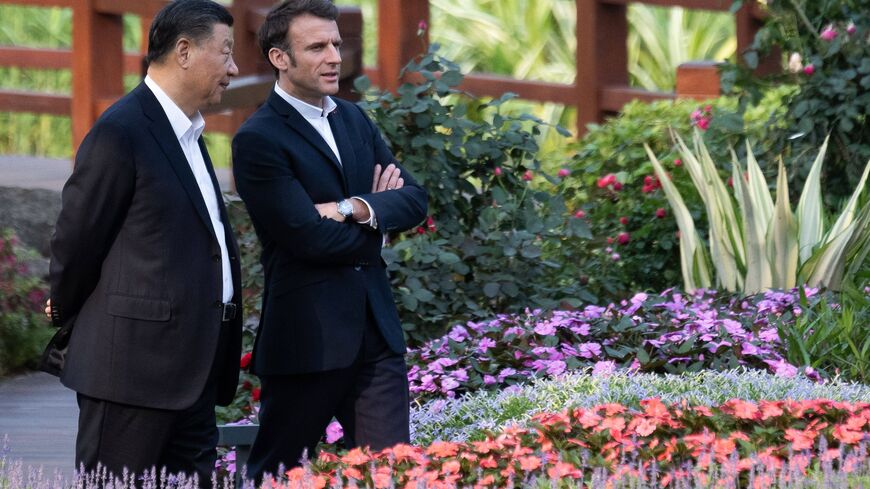PARIS — A joint statement by French President Emmanuel Macron and his Chinese counterpart Xi Jinping last Friday referred among other things to common efforts for reviving the nuclear deal, officially known as the Joint Comprehensive Plan of Action (JCPOA), with Iran that was signed in 2015 but stalled following the US withdrawal from the agreement in 2018.
The statement noted that both countries "reiterate their commitment to promoting a political and diplomatic settlement of the Iranian nuclear issue," adding that France and China pledge to work together to preserve the international nuclear nonproliferation regime and relevant UN Security Council resolutions.
On Thursday, while accompanying Macron on his China visit, French Foreign Minister Catherine Colonna met in Beijing with her Iranian counterpart Hossein Amir-Abdollahian, a rare first meeting between the two.
A statement by the French Foreign Ministry said that Colonna reiterated France's demand for the immediate release of six French nationals detained arbitrarily by Iran and that the conversation addressed the situation in Iran, various regional issues and the Iranian nuclear program. Asked by Al-Monitor, the ministry refused to offer any more details on the meeting or to assert whether any other meetings between French and Iranian diplomats are scheduled for the near future.
The three-day visit for Macron to China highlighted French and European efforts to engage China in attempts to end the Ukraine war. Beijing’s growing presence in the international diplomatic arena in general and its ties with Moscow have turned the Chinese soft power into an unavoidable actor in the Middle East and Europe. More so, it signals that for France, whether the United States likes it or not, China must be taken into account on Iran and other Middle East dossiers.
The China-brokered agreement between Saudi Arabia and Iran last month shook both the United States and Europe. Macron, speaking to Politico while in China, said that Europe must reduce its dependency on the United States, resisting pressure to become "America’s followers." The French president was referring to the issue of Taiwan, but the same logic can be implied also in other conflicts. Macron’s interview with Politico showed he is ready for independent French diplomacy.
A first such step was evident with the two Baghdad conferences (August 2021 and December 2022) initiated by Macron in order to help stabilize Iraq ahead of elections. Paris stepped in where Washington has left a diplomatic vacuum. Thus, France may be now positioned as one of the key players in expanding leverage inside Iraq. The long-stalled talks over the $27 billion Total Energy deal with Iraq are moving forward. Also, France’s strong ties with Gulf countries, including Saudi Arabia, the United Arab Emirates and Qatar, offer it more diplomatic space to work on the Iran file and Gulf-Iranian rapprochement.
The current French frenzy on Iran comes on the backdrop of difficult bilateral relations between Paris and Tehran since the 2022 death of Mahsa Amini in police custody and Tehran's crackdown on demonstrators.
Paris has been criticizing Tehran heavily for violations of human rights and had been instrumental in the European Union adopting sanctions against Iranian personalities and entities involved in breaching human rights. The arrest of several French nationals aggravated the diplomatic crisis.
That being said, Paris maintains its position in favor of dialoguing with Tehran for a new agreement on its nuclear program. Macron met Iran's President Ebrahim Raisi in New York last September, and diplomatic channels remain open between the two countries. For now, China could be the missing piece in the puzzle, as France hopes Beijing could push Iran in returning to the deal.








